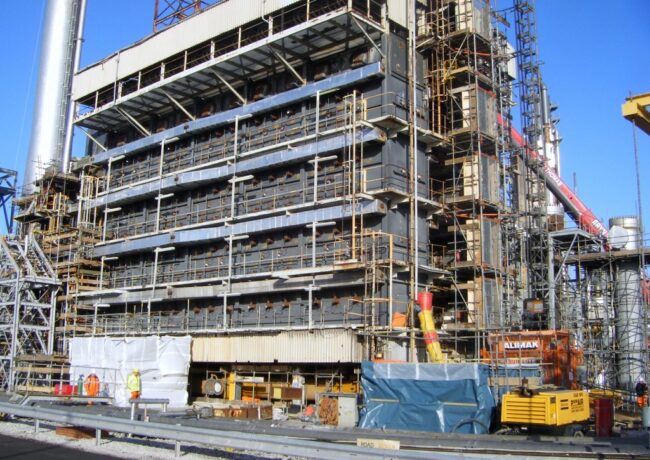GrowHow fined £60k after asbestos discovery
A fertiliser manufacturer has been fined £60,000 after 50 workers were exposed to potentially deadly asbestos fibres while refurbishing plant in Ince Marshes near Ellesmere Port.
GrowHow UK was prosecuted by the Health & Safety Executive after asbestos was discovered during the refurbishment of a 50-metre-high industrial furnace known as the Primary Reformer on 31 January 2011.
Chester Crown Court heard that contractors had been demolishing brickwork and insulation boards for two days, using hammers, chisels and crow bars, before a bricklayer raised concerns that asbestos may be present. This was confirmed when material from the site was taken for analysis.
The HSE investigation found GrowHow had failed to carry out an appropriate asbestos survey before allowing the project to start, despite the fact that the demolition work was likely to create large amounts of dust.
Workers had been breaking up rubble, putting it into sacks and pouring it down a chute so the sacks could be reused, without knowing the dust they were creating may have contained asbestos fibres.
Once asbestos was discovered, the workers were ordered to leave the site and all of their protective clothing and equipment was bagged up and destroyed due to the risk of contamination.
GrowHow UK was fined £60,000 and ordered to pay £17,094 in prosecution costs after pleading guilty to one breach of the Control of Asbestos Regulations 2006 and two breaches of the Health & Safety at Work etc Act 1974 on 4 October 2013.
Speaking after the hearing, Daniel Longdon, HSE Inspector, said: "Dozens of workers at GrowHow were exposed to potentially deadly fibres because the company didn't carry out a risk assessment to see if asbestos was present in the industrial furnace.
"They will have to live with the uncertainty for the rest of their lives of not knowing whether they will develop lung cancer or other diseases, such as mesothelioma, as a result.
"If GrowHow had arranged a proper survey ahead of the work starting then the asbestos would have been identified and a licensed contractor could have been brought in to remove it safely."
Around 4,000 people die every year as a result of breathing in asbestos fibres, making it the biggest single cause of work-related deaths in the UK.
Asbestos fibres that are breathed in can become lodged in the lungs or digestive tract, and can lead to lung cancer or other diseases. Symptoms may not appear for several decades.
Contacted by Place North West for comment, a GrowHow spokesman said: "GrowHow takes the circumstances which led to breaches of health and safety regulations on its site very seriously and acknowledges the level of the fine imposed by Chester Crown Court.
"As a business we understand that health and safety needs to be our prime consideration. Asbestos was known to be present on the site, but an earlier survey had shown there to be none in the reformer and it was on this basis that the work went ahead.
"As Judge Dutton acknowledged, although the work took place over two days, the direct exposure was very short.
"As soon as workers saw different materials, they correctly raised concerns, and the Company took an immediate decision to halt work.
"The affected area was made safe and measures were put in place to prevent further exposure to fibres.
"The clothes and mess facilities of the workers were thoroughly checked and tested straight away and no fibres were found.
"Those who had been working in the area were given support and practical advice by the company.
"Since the incident in 2011, in addition to making changes to systems and procedures, GrowHow has spent £4m on the removal of asbestos containing materials on the Ince site."




